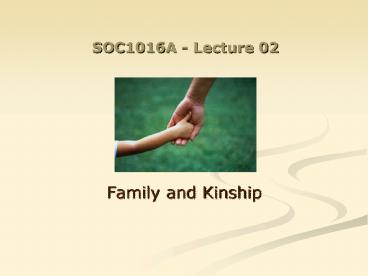SOC1016A - Lecture 02 - PowerPoint PPT Presentation
1 / 15
Title:
SOC1016A - Lecture 02
Description:
Kinship is the most important social institution in many simple, stateless ... institution, which has to do with politics, economics, religion, cosmology, etc ... – PowerPoint PPT presentation
Number of Views:31
Avg rating:3.0/5.0
Title: SOC1016A - Lecture 02
1
SOC1016A - Lecture 02
- Family and Kinship
2
Last week
- Social Anthropology explores the cultural
dimension of social institutions. Its perspective
is - Holistic
- Comparative
3
In this lecture
- Kinship is the most important social institution
in many simple, stateless societies. In these
settings, social organisation is often structured
along kinship principles. - Cultural dimension of kinship. In different
societies one finds different ideas about how to
classify somebodys kin. There are not
necessarily related to blood ties.
4
Kinship basic terminology (1)
- Lateral relatives (aunts, uncles, and cousins)
- Lineal relatives (through generations)
- Lineage set of individuals who can indicate
their common descent from a common ancestor - Clan set of individuals who assume a shared
descent
5
Kinship basic terminology (2)
- Transmission of kin
- patrilineal
- matrilineal
- double
- cognate
- parallel
- crossing
- Corporate kin group new members are recruited
through genealogical principles
6
- Kin groups can form the basis for political
stability. One can trust ones relatives because
there is a web of obligations/sanctions. - Kinship is thus related to
- political stability
- Inheritance, transmission of resources
- Succession, transmission of rights, duties, status
7
Kinship conventional signs
8
(No Transcript)
9
Case-study 1 the Trobriand Islanders
- Society based on matrilineal clans (dala).
- But this does not mean that this is a matriarchal
society. Each clan has a male chief, and men
control political and economic activities (e.g.
land rights) - Why then matrilineal clans? The answer is to be
found in their beliefs about conception and
womens natural powers.
10
On the Trobrianders
- A. B. Weiner, The Trobrianders of Papua New
Guinea, 1988 - Film The Trobriand Islanders of Papua New
Guinea, 1952
11
Case-study 2 the Nuer of Sudan
12
- The Ghost Marriage
- Genitor / Pater
- Genitrix / Mater
- For the Nuer people, then
- - Lineage does not depend on blood
- - Kinship ? genealogical connections
13
On the Nuer
- E. E. Evans-Pritchard, Kinship and Marriage among
the Nuer, 1951.
14
Conclusions
- Kinship is a social institution, which has to do
with politics, economics, religion, cosmology,
etc - Kinship systems do not merely follow from
biological kin relations, but are socially
constructed
15
Why this is relevant to us
- 1- Against Sociobiology
- 2- Current socio-political issues.
- Case-study on East London
- (M. Young, P. Wilmott, Family and Kinship in
East London) - 3- Current debates on new reproductive
technologies































